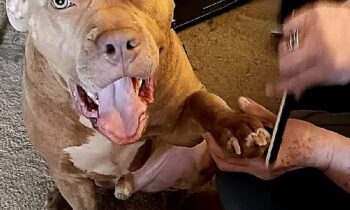
Last week, we heard from dog trainers in the United States and Canada about what long-term changes they expect in their profession as a result of COVID-19. This week, more trainers talk about what they used to do, what they’re doing now, and what they hope for dog training in the future.
Jorge Melara (Wisconsin) I purchased a tripod gimbal (camera stabilization) combo as well as a wide-angle lens that clips right to my phone, so I can demo with my pup or a stuffed dog and have my hands free while training. I have a variety of videos that I send to clients to teach a variety of behaviors, then we are able to troubleshoot and expand when in “person.” I go between FaceTime, Messenger, and Zoom. I’m also working on more minutely detailed videos to help clients better prepare for appointments—everything from how they set up their cameras to cutting up treats. Having the clients prepared makes the sessions go more smoothly. The devil is in the details! Zero commute time is amazing, but not touching dogs and not being able to demo in person can be tough. I also feel as if there is a huge amount of intimacy that is lost by not being there in person. I also notice that my field of vision is limited to the screen size. I have to be all the more observant and descriptive when directing clients.
Divine K-9
https://www.divinek-9.com/
Brian Burton (New York) I suspect the following changes for our industry:
1) Prices and support will need to be more competitive as people spend less.
2) Adding convenience to make things like camps and boarding easier (pick-ups/drop-offs)
3) Integrating online consulting into in-person offerings to offer a more convenient and cost-effective blended option
4) For a period of time, in-person options will be done outside with distance. I think it’s just reality, so we adjust and move on!
Debby McMullen (Pennsylvania) I am currently seeing people only via Zoom. I will develop a page on my website to continue doing that, especially for the breeder referrals that I’ve been getting for one of my particular breeds (Caucasian Ovcharka), from all over the country and even in Canada. I will resume outdoor sessions with clients this weekend. Any new outdoor clients will be required to have a Zoom session first.
I’m not sure what I’m going to do about in-homes. My county is going to the green phase next Friday, so technically that should mean I can do in-homes, but I’m not sure I’m comfortable with that yet. In any case, all client sessions that are in person, regardless of whether they are outside or not, will require masks and I will no longer demonstrate anything with their dogs. I will coach them and demonstrate without the dog.
Pawsitive Reactions
https://www.pawsitivereactions.com/

Photo by Paul Shelbourne (Dave The Urban Puppy is on Facebook!)
Sarah Richardson (California) Group sizes, typically eight dogs or puppies, have been downsized to three to four dogs or puppies. I feel sad that puppies will have a smaller group of other pups and people to be exposed to. I expect that I am going to need to raise my prices, which may exclude some people from class, and that will be unfortunate. To reach them and others, I am launching some online seminars. Also all consults are via Zoom now, as I won’t go into people’s homes. I will start doing private sessions at my center (1,400 square feet) so we should be able to maintain plenty of distance. Honestly, I’m feeling a bit overwhelmed by it all.
The Canine Connection
https://thecanineconnection.com/
Bobbie Bhambree Wirkmaa (New Jersey) Behavior Vets is, we’re thankful, busy. We are working remotely in our New York office and are starting to see clients in person (social distancing) in our Colorado office. If we have the ability to meet with NY clients in the suburbs, we are starting to meet in backyards while social distancing. Although we work with puppies and offer basic training, our niche market is behavior, so folks see the value of investing in their animals regardless. Behavior work is very doable via Zoom.
Behavior Vets
https://www.behaviorvets.com/
Bobbie Lyons CCFT (Oregon) Much of my business for K9Fitness is already online. Prior to COVID-19, I saw a few clients in person each week but, of my 1:1 lessons, designing canine fitness for sporting dogs is done online, so I haven’t really skipped a beat. My days are still filled with lessons. I have had a few people come in person but have also had times when I said NO. I have also had times during this that I left it up to the client and, if they want to do an online lesson instead of in-person, I am good with that, too. Some of my online students have spread their appointments further apart, but I give them the information to keep going in between. I have lost very few clients, but there have been some that just can’t afford to continue. I have gained new clients due to the stay-at-home order—they just want to keep their dogs in shape and have something to do while staying at home. I fear that so many dogs are going to get injured after the stay-at-home orders are lifted because folks are not keeping their dogs active and strong during this time. I have not been traveling. All traveling to teach K9FITness has been cancelled until October. I will re-evaluate probably in the first part of August on where we are, and if further cancellations need to be made.
Bobbie Lyons Canine Campus
https://www.bobbielyonscaninecampus.com/
Michael Curran (Texas) Houston Dog Behavior and Training will be reevaluating going to homes and seeing families in person on August 1. I will continue online remote consultations following the reopening due to the success and breakthroughs we have seen working remotely with many of our most challenging cases—decreased stress on dog and family, increased scheduling flexibility, reduced waiting lists, and the ability to service underserved areas. Reopening, I will be breaking down my week into two to three online days and two to three in-person sessions. I really love working online; I wish I could effectively do my job 100% online in all cases. (I joked with a client and my veterinary behaviorist, “Maybe we can do the exposures to my movement by moving the iPad?”) The transition online has better facilitated collaboration and communication among the entire team. I hope the acceptance of online work and the platform continues and that this is the next niche of the industry, similar to how private one-on-one in-home work was once seen as impractical and out of the norm.
Clarity in communication is key; giving students small successes in the beginning goes a long way. The way I transfer skills:
▪ I have a prerecorded video of me walking an experienced client through a simple exercise step by step, like luring sit, down, stand, lateral recumbency, or nose touch. I then ask if they have any questions.
▪ Next, I walk them step by step through the exercise, giving them immediate feedback on timing and mechanics.
▪ If they continue to have issues, I demonstrate key concepts with a puppet, possibly having them mirror what I am demonstrating.
I tend to be the last house on the block in an area of heavy traditional, aversive-based techniques. The more cases I worked, the more confident I became in what I was selling and the easier it became to answer questions with examples. A breakdown of active cases I am working right now:
▪ Human/owner direct aggression: 33
▪ Intra-household aggression: 18 (including one in Colorado)
▪ Leash reactivity: 33
▪ Severe shy/timid: 8
▪ Resource guarding: 11
▪ Puppies: 11
▪ Dog/baby or toddler: 10
I have 60 ongoing unique active cases—many dogs fall into multiple categories—and I am collaborating with a veterinary behaviorist on about eight of these cases.
Houston Dog Behavior and Training
https://www.houstondogbehavior.com/
Online What? A Discussion of Remote Dog Behavior Consulting
https://www.youtube.com/watch?v=Hy–DmiaJ-k&feature=youtu.be
Have you consulted with a dog trainer during the stay-at-home? What technology did the trainer utilize to offer you an “in-home” consultation without really being in your home? Were you comfortable with the technology? Will you continue working “virtually” with the trainer? Do you plan to take in-person classes when your area makes that possible again, or will you stick with online lessons?



